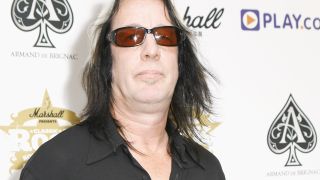Equal parts technophile, artist and producer, Todd Rundgren is a wilful shape shifter whose music ranges from the winsome pop perfection of his solo Something/Anything to the brilliant experimental prog rock of Utopia. He produced Meat Loaf's Bat Out of Hell, and records by artists including Patti Smith, Grand Funk Railroad and The Band. Along the way he has released numerous solo albums and with his bands The Nazz and Utopia. Recently he fronted the New Cars (in place of Ric Ocasek), and has just released his 20th solo album, Arena, which will confound listeners as much as anything he's done.
A few years ago you said you’d given up concept albums. What’s the organising principle behind the new album?
I’m trying to recall when I said I wasn’t doing concept albums, because this is the second one in a row; Liars was a concept album. I think I discovered that my fan base prefers me to have a concept rather than a collection of songs. It gives them a context in which to listen to the music. If I give them some framework to work with, then it makes it easier, I guess, to get the message.
**How do you decide that it’s time to make a new record? **
I’m not ready to make another record until I’m sick of that [previous] record. I have to listen to that record until I just get completely fed up with it. Ergo, I will avoid repeating something I’ve already done.
So you do listen to your own work?
Yes I do. And for a number of reasons, actually. The first reason is because I have to know it. If you’ve recorded something, it doesn’t necessarily mean you know it, it means you finished it. I will invariably wind up playing most of what I’ve written, and so I need to have it down pat, so that I can show other people what they need to play as well. I also listen to it to see whether it excites me.
**From 1972’s Something/Anything? to 1973’s A Wizard A True Star you changed your style radically. What happened? **
Mescaline went off in my head, essentially. A lot of my musical evolution, particularly in the early years, was fuelled by whatever drugs I was taking. And I was taking the drugs in order to fuel my artistic evolution. I would eventually get to the point where I felt I had plateaued, and would need to have something unusual happen to me mentally in order for me to get the blinkers off and start looking in other directions. When I took the mescaline, that’s when I realised, or when I theorised, hey, it may be possible to take this chaos in my head and map it directly onto a record.
**Did Arena begin as a pastiche and then become something more? **
I think it is more of an homage than a pastiche. Almost every song has some precedent. I don’t necessarily care to name what they are because it might spoil it.
When I decided I was going to do an arena rock record, first thing I did was I went out and bought [Def Leppard’s] Pyromania and Boston’s first album, just to re-familiarise myself with the form, and to figure out what made them successful as that kind of an act. I listened to them each once, and then put them away because I didn’t want to be imitating anything that was on it. It’s perfectly fine to do an homage, but you have to avoid aping them.
**You’ve said that most of your inspiration came from the piano, but here you are making a guitar album. **
Well, it has its roots in the somewhat abortive re-formation of The Cars [in 2007] that I was involved in. Right at the beginning of what was supposed to be our year of world touring and such, we had an accident in the bus and Elliot [Easton, Cars guitarist] broke his collarbone. So the tour just came to an abrupt halt, and I found myself with nothing to do and was uncomfortable with it. The easiest thing to do was to put together a guitar quartet with players that I knew, and I put together 10 days across Canada and just played all the songs that were most appropriate to a guitar quartet.
Were you playing covers?
No, no, all my material. But we would do, for instance, things from Liars but rearranged for guitars only. When American fans found out that we’d done this thing in Canada, they demanded that we do it, and the crowds just started getting bigger and the response started getting more and more enthusiastic. So I knew that with the next record I was going to make, I shouldn’t confound expectations this time, I should actually play to the expectations. And it’s perfectly appropriate, because I haven’t done a record exactly like this before. It’s been years and years since I put this kind of focus on the guitar.
Not since you were in Utopia, really.
Pretty much, yeah.
What was your thinking behind Utopia?
One of the biggest influences in Utopia’s chequered history was Mahavishnu Orchestra – their The Inner Mounting Flame album. That record just drove everybody crazy. There was fusion music before that, but this defined it for everyone. When you’re a songwriter, you realise that everything you do is going to be sung over, and so you can minimise a lot of what you do because the real emotional impact comes from the words and the singer and the way he delivers it. And suddenly this [Mahavishnu] was the kind of music that had this incredible, passionate mystery to it, and no singer; no words to help convey it. It had to be conveyed through what you played. And I think it helped us all reconnect to the jazz greats, like Charlie Parker, who can make you cry and they don’t have to sing a note.
Was that part of your mission with Utopia – to convey emotion without words?
It was part of it. I had a dual mission. The reason the band was called Utopia was because I thought that you could actually accomplish things socially through music. That was another thing that I got from The Beatles. Every time The Beatles came out with a new record, the world was awaiting it. The youth of the world were saying: “What do we do now? Tell us what to do now. Should we take acid? All right, we’ll take acid. Sleep in a bed for peace? Yeah, let’s do that.” I miss the time when music had the power to polarise, for better or worse, the entire planet.
GOING TO HELL
When Todd Rundgren produced Meat Loaf’s Bat Out Of Hell he had no idea it would become a monster hit.
“Nobody did,” he says. “As a matter of fact they had been through just about every credible producer in the business before I took on the project. But that’s because every other producer was probably looking for the commercial possibilities. I thought it was a spoof on Bruce Springsteen, and I thought that that needs to be done. I was very enthusiastic about making the record, but for that reason, and not because we thought it was going to be a big smash. Bearsville Records [the label Todd was signed to] had right of first refusal and turned it down. They shopped it for about eight months or so after that. We didn’t think anybody was going to release the record.”
BARDO LIVE


